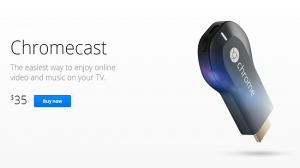Chromecast, from Google
Ajit Deshpande - August 1, 2013 - 0 Comments
 So the $35 Chromecast is in the market now, having been released last week. Chromecast is a small form-factor dongle that can be directly connected to the HDMI port on a TV and which can stream content over Wi-Fi from any of our mobile devices as well as from Google Chrome browsers on PCs. Functionally similar in many respects to the Apple TV, Chromecast takes streaming-to-television to the next level, being platform and OS agnostic, easier to install, and significantly cheaper.
So the $35 Chromecast is in the market now, having been released last week. Chromecast is a small form-factor dongle that can be directly connected to the HDMI port on a TV and which can stream content over Wi-Fi from any of our mobile devices as well as from Google Chrome browsers on PCs. Functionally similar in many respects to the Apple TV, Chromecast takes streaming-to-television to the next level, being platform and OS agnostic, easier to install, and significantly cheaper.
Currently, approx. 14% of broadband-enabled households in the United States own a dedicated streaming device (Apple TV, Roku or other), whereas 25% own a Smart TV (which come with streaming capabilities embedded). Smart TV adoption has doubled whereas streaming devices have only seen a small uptick in penetration over the past two years. Thus, the Chromecast (or any streaming device for that matter) might only be a medium term solution until smart TVs become the default in households. The long-term objective for Google would then be to own the streaming software / firmware layer inside smart TVs, and, consistent with Google’s approach for all its new offerings, Chromecast will serve as a great testing-ground for Google in this pursuit.
From a TV broadcasting perspective, is Chromecast yet another (and maybe the strongest yet) candidate for disrupting revenues for the cable networks and content studios? Can the TV screen be disrupted to become just another screen for online content to be consumed and interacted with? A certain amount of upheaval is bound to happen, for example around access to on-demand content and ability to rate such content. But beyond that, the psychological aspects of TV viewing such as the relatively passive, lean-back experience and the content discovery aspect will still need to be fulfilled. Given these needs, can smart content from YouTube upend traditional broadcasting media? Probably a bit, like Pandora is doing to radio, but beyond that, things should still remain broadly the same for broadcasting.
And thus continues the trend towards multi-screen convergence. Here’s hoping that despite the evolution of technology, there will still continue to be a single-button-push, stupid-smart, lean-back-and-relax, right brain experience like TV is today (and hopefully for cheaper monthly rates!).